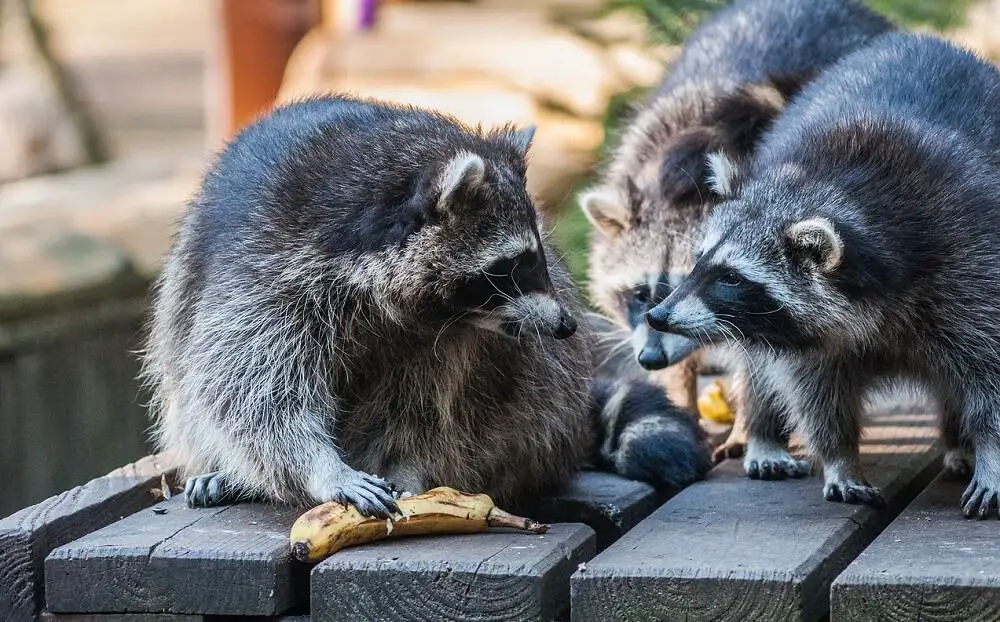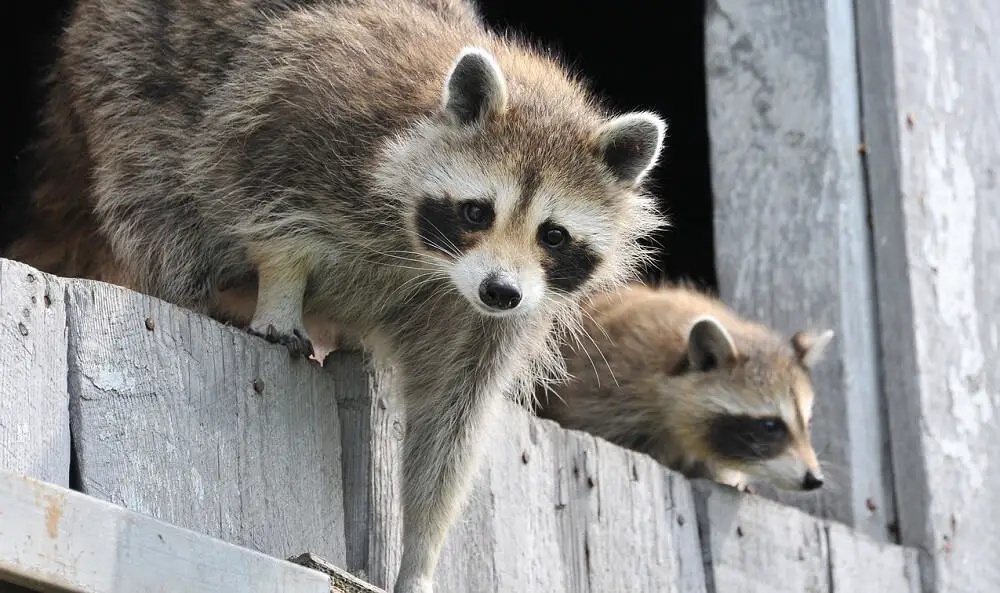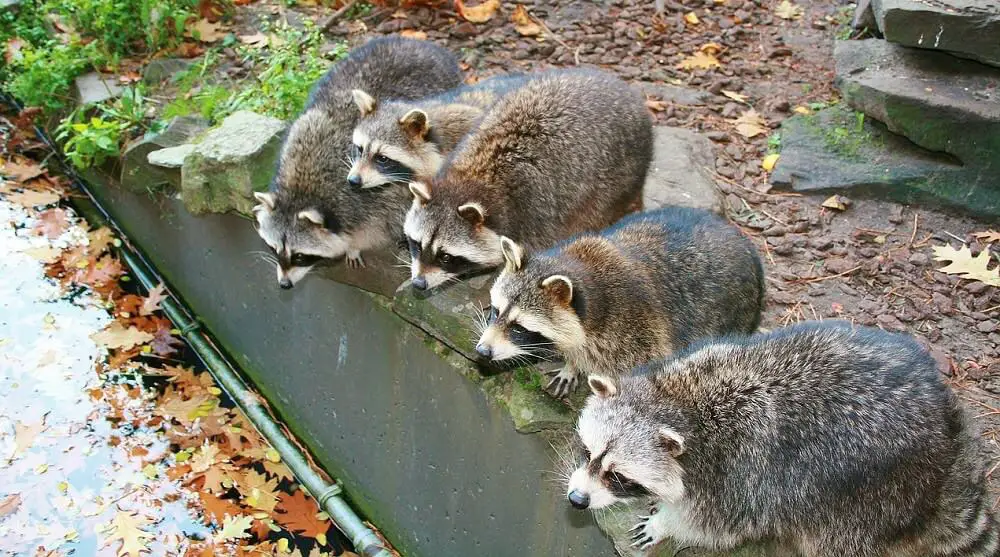
And for good reason!
Raccoons carry infectious diseases such as rabies, roundworms, and salmonella. They will rummage through trash, and if you have chickens, they will eat and steal them. If you have pets, raccoons are ferocious enough to do some serious damage to your pets.
Plus, they are the heaviest carriers of wildlife rabies. Nearly half of all US reports of rabies are from raccoons.
Is there a spray to kill raccoons? No. There is not a spray to kill raccoons. If you have raccoons, determine what attracted them to your yard. Eliminating those conditions will prevent them from returning. There are spray repellents that will keep raccoons away, but they only work temporarily. So, before buying a spray, consider all the options.
As cute as they might look, raccoons are wild animals that you don’t want to tame. Rather, take preventative measures first. Then know what the options are and apply them to your situation. Read on to find out how to prevent and repel raccoons.
Are Sprays Effective Ways to Get Rid of Raccoons?
Generally speaking, sprays are not the most effective way of dealing with a raccoon problem, but it depends on several factors.
| Situation | Effectiveness of Spray |
| Occasional or seasonal raccoons that nibble on plants | Good if you have a small yard or a few plants |
| Numerous raccoons in your neighborhood that have taken up residence elsewhere | Will work as a temporary measure until you find other measures |
| Raccoons that have taken up residence in your yard | Unless you eliminate whatever attracted them to your yard, the spray will be a temporary deterrence at best |
| Raccoons are in your house | It is time to call animal control or a company that removes small animals |
Before you buy sprays, you need to analyze your situation. Sprays will work as a temporary deterrent, but you will need repeated applications to ensure they move along.
And if they don’t move along, then sprays will, at best, provide temporary relief while you put other measures into place.

Are Some Sprays Better Than Others?
Most sprays seem to work about the same. They cover small areas and do so until the scent wears off. Then the area will need to be sprayed off. Since rain washes it away, you will have to use the spray again afterward. And desperate raccoons will eventually begin to ignore the smell.
However, if you only have a small area that you want to protect, and there is not a large population of raccoons, there are a few repellents that are effective in certain situations. Check out my resource page on the Best Animal Repellents.
What We Like
- Not poisonous—it deters raccoons and other rodents with natural ingredients, such as pepper oil and capsaicin (a chili pepper extract).
- It lasts for up to 30 days until it rains
What We Don’t Like
- It needs repeated applications, especially after rain
- The ingredients that repel raccoons are readily available
If you want a no-fuss, no-muss spray, then purchase one as the Safer Brand. However, for much less, you can mix up your own.

Hot Pepper Spray
For this homemade spray, you will need either hot sauce or powdered cayenne pepper. We recommend the powder because you can control how much pepper you use.
- Fill a gallon container with water and add several tablespoons of cayenne pepper
- Stir the mixture
- Add a couple of drops of detergent so the spray will stay where you apply it
- Apply the spray around areas you want to be protected
- Reapply as needed
This homemade spray is the one most commonly used. It is cheap and easy to prepare.
Ammonia
Raccoons are reportedly very clean animals who don’t like the smell of urine near their dens or food. Ammonia is a component of urine, and many people report success using ammonia as either a spray or by soaking it in rags they place around areas they are trying to keep raccoon free.
Onion and Pepper Spray
This spray adds another scent that raccoons don’t like. You’ll need an onion, a jalapeno pepper, and several tablespoons of cayenne pepper.
- Chop the onion and jalapeno pepper
- Put them in a large pot with a half-gallon of water. Add the cayenne pepper and bring the water to a boil
- Allow the mixture to steep for an hour
Just like the hot pepper spray, add a drop of dish soap and then bottle and spray away.
This spray requires a little extra work, but it’s another one to have in your arsenal. One of the weaknesses of most sprays is that raccoons get used to the odor and begin to ignore it. By alternating between several sprays, raccoons don’t have time to get used to one odor.
Are there Other Options Besides Sprays?
Of course, there are some strategies you can employ if you’re dealing with raccoons that don’t involve sprays at all. Consider taking preventative measures or using other deterrents like those listed below.
Preventing Raccoons
They say that an ounce of prevention is worth a pound of cure. If you don’t have raccoons in your yard yet but are worried about them, take these steps to prevent them from taking up residence. If you already have raccoons wandering around at night, put them in place. Otherwise, your raccoons will likely return, especially if all you use is a spray.
Here are the most important measures you need to take
- Do not feed them. Garbage is an excellent source of food, so make sure they have no access to it.
- Other sources of food include pet food for outdoor pets. Leaving out pet food is an invitation to come over for a buffet meal. Since raccoons are nocturnal, a solution is to bring your pet’s food in at night.
- Don’t leave out water for them to drink or frolic in. If you have a kiddie pool, empty it at night, or cover it up.
- Don’t provide a shelter for them. Make sure they don’t have access to your house, a shed, or any other structure where they could take up residence. If you have chickens, you undoubtedly have taken preventative measures. If not, you should.
Keeping Them Out with Barriers
Fences by themselves will not provide much of a barrier to an animal that easily climbs trees. However, if you have a vegetable garden or barnyard animals like chickens, you probably have a fence already.
Electric fences will keep raccoons away, but it is not necessary to have the entire fence electrified. Instead, run a single wire about 8 inches up from the ground. Some homeowners use a second wire run a second wire another 6 to 8 inches higher.
Since raccoons are nocturnal, some people use a timer and electrify the wire from dusk to dawn.
Scaring Them Away
There are several ways to scare raccoons away—light, sound, and water.
- Light. If you don’t have them yet, get floodlights for your house. In order for floodlights to work, they need to light up the entire area. Use motion sensor lights to save on your light bill. Lights work only so long—after a while, raccoons will realize nothing happens when the light comes on and go about their merry way.
- Sound is another option. Some people set a radio to an all-night talk station and let it play outside. Another option that might annoy your neighbors less is a motion-activated noise deterrent. Check out my resources page on the best light, sound, and water repellents.
- Water. Ignoring sound and light becomes easy with time. The same isn’t true for water. Sprinklers with motion-sensors are the most effective measure for scaring raccoons away. The Best Motion Activated Sprinkler and Lights page has my recommendations. They are effective until the raccoons figure out where they are. Then they just avoid that area, or if they are sneaky enough, come up behind the sprinkler and knock it over. That’s an easy problem to solve—move the sprinkler every few days.
Can I Trap The Raccoons Myself?
If you are asking this question, our advice is to look for someone else to do that. Raccoons become aggressive when caged, and there are many issues that arise when they are dumped elsewhere.
Plus, in many states, it is illegal to move wildlife to another area. This can drastically upset the eco-balance in the new area. It can introduce disease to the area where you drop the raccoons, and it can cause a lot of damage.
Raccoons have been known to travel 18 miles to forage for food.
Conclusion
If you are looking for a short-term solution for keeping raccoons away from your yard, then consider using a spray. A commercial one means you pick up a container and spray away. Homemade requires a little preparation but is less expensive.
If you have a large garden, keep chickens, or live in an area where there are a lot of raccoons, then you will have to use other measures as well. The key, though, is to keep them out of your yard in the first place.
Related Articles
You may also find these related articles helpful.
10 Ways to Keep Raccoons from Killing Your Chickens
Keep Raccoons Away From Your Campsite, Trashcans, & Garden
What To Do If You Get Bitten By A Squirrel

